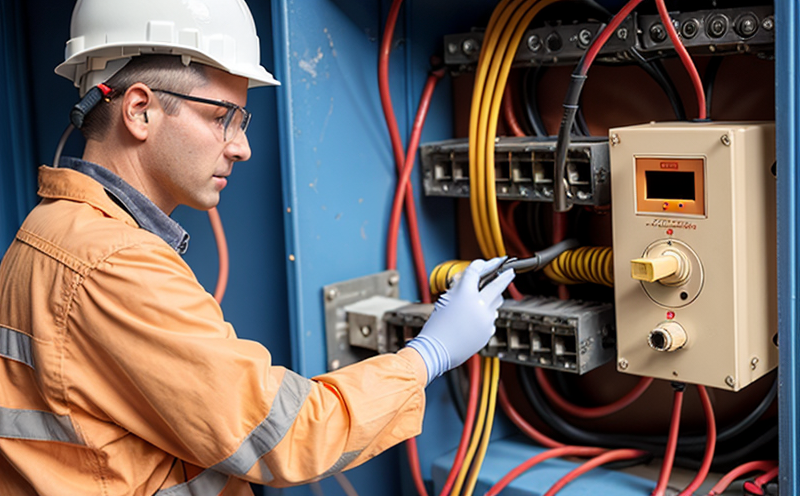Protective Conductor Resistance Electrical Safety Test
The Protective Conductor (PC) or Earth Continuity Conductor (ECC) is a vital component in electrical safety systems. It ensures that any fault current can safely be directed to the earth, thereby protecting against electric shock and fire hazards. The resistance of this conductor plays a critical role in determining its effectiveness. This service focuses on evaluating the resistance of protective conductors using precise methodologies compliant with international standards.
The test is essential for verifying compliance with relevant safety regulations such as IEC 60364, which specifies requirements for electrical installations and protection against electric shock. In environments where electrical installations are critical (e.g., healthcare facilities, industrial plants), ensuring the protective conductor has minimal resistance ensures reliable operation during fault conditions.
The testing process typically involves disconnecting the live supply from the installation under test. Then, a low-voltage AC or DC current is passed through the protective conductor to measure its resistance accurately. This measurement helps determine if the conductor meets the specified maximum resistance value as outlined in the relevant standards. For instance, IEC 60364-5-58 specifies that the resistance should not exceed 1 ohm for Class 0 or Class E devices and 10 ohms for other installations.
During specimen preparation, it is crucial to ensure that all connections are clean and free from contamination. This ensures accurate measurements of the protective conductor's true resistance without any interference. The apparatus used includes a low-voltage power supply capable of delivering controlled current levels suitable for the measurement range required by the standards.
The test results provide critical insights into whether an electrical installation meets safety requirements regarding earth fault protection. By conducting regular tests on protective conductors, facilities can prevent potential hazards associated with high resistance values that could lead to inadequate fault currents being directed to the earth. This proactive approach enhances overall safety and compliance within industrial settings.
Understanding the importance of this test is paramount for ensuring robust electrical systems in various sectors including healthcare, manufacturing, and residential buildings. Regular testing not only complies with regulatory requirements but also contributes significantly towards improving workplace safety by identifying issues early on before they escalate into serious incidents.
Scope and Methodology
The scope of this service encompasses evaluating the resistance of protective conductors within electrical installations to ensure they meet specified safety criteria. The methodology involves disconnecting the live supply from the installation under test, then applying a controlled low-voltage current through the protective conductor using specialized equipment.
- Testing is conducted according to international standards such as IEC 60364 and local regulations applicable to specific regions.
- Specimen preparation includes cleaning all connections thoroughly to avoid any interference in measuring true resistance values.
- The apparatus used consists of a low-voltage power supply capable of delivering controlled current levels appropriate for the measurement range required by standards.
This approach ensures accurate and reliable measurements, providing valuable data on whether protective conductors comply with safety requirements. By adhering strictly to these protocols, we guarantee that our clients receive comprehensive assessments that are both compliant and effective in enhancing electrical safety across diverse applications.
Benefits
Elevates overall workplace safety by ensuring that protective conductors can effectively handle fault currents during an earth fault.
Avoids potential hazards associated with high resistance values, which could lead to inadequate fault current being directed to the earth.
Ensures compliance with international standards and local regulations pertinent to electrical installations.
Promotes long-term reliability of electrical systems by identifying issues early on before they escalate into serious incidents.
Supports proactive maintenance strategies aimed at enhancing safety and operational efficiency within industrial settings.
The Protective Conductor Resistance Electrical Safety Test is a cornerstone in maintaining robust and safe electrical installations. By incorporating this service into your regular maintenance routines, you demonstrate commitment to both regulatory compliance and employee well-being.
Quality and Reliability Assurance
We take pride in delivering high-quality services that meet the highest industry standards. Our team of experts adheres strictly to international guidelines like IEC 60364 when conducting tests, ensuring accurate results every time. We employ state-of-the-art equipment and follow rigorous procedures to maintain consistency across all projects.
Our commitment extends beyond just performing tests; we also offer valuable insights into potential areas for improvement based on our findings. This collaborative approach helps clients make informed decisions about necessary upgrades or maintenance activities. By leveraging our expertise, you can rest assured that your protective conductors are in top condition, contributing significantly to safer working environments.





